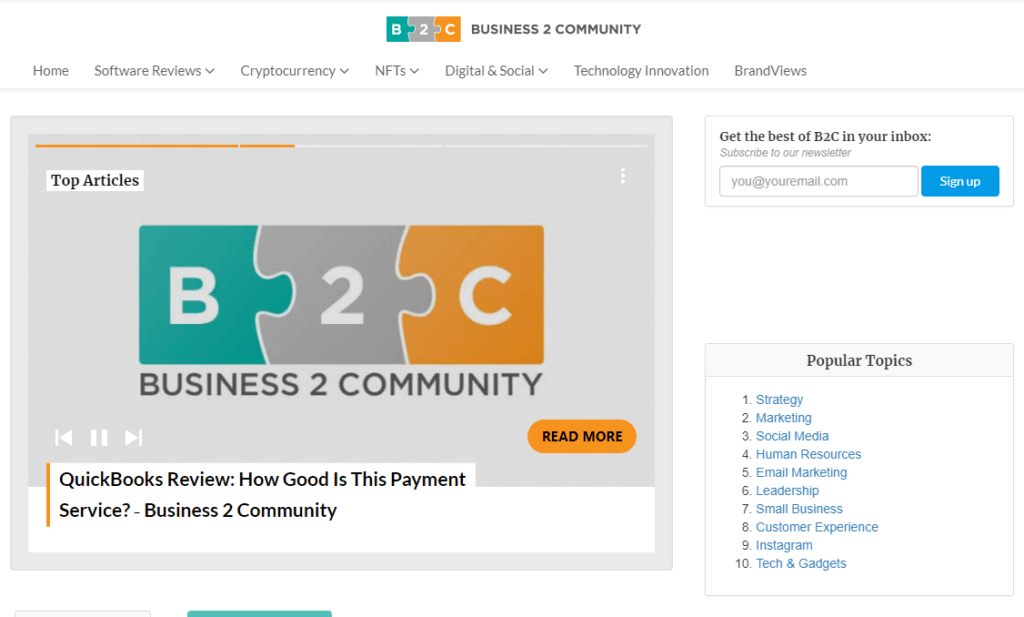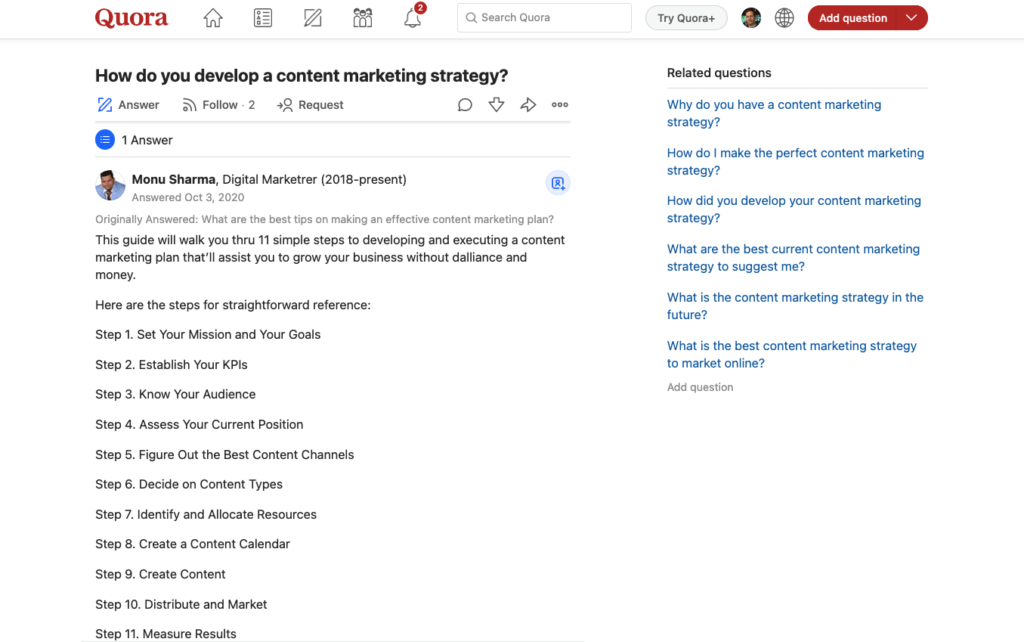6 Content Syndication Platforms That Won’t Hurt Your SEO

Creating compelling, authoritative content takes time, and it can be costly. When you make great content, the goal is to put it out in the world, so it can rack up views and shares, elevate your brand authority, and generate positive ROI. The question is, how can B2B companies that invest in high-quality content production find an affordable way to reach a wider audience?
Content syndication via third-party platforms is a very effective way to do just that. But there’s a catch – if you’re not careful about where and how you syndicate your content, you can end up doing damage to your SEO rankings.
B2B marketers know that content marketing drives conversion rates as much as five times higher, making it indispensable as a marketing strategy. At the same time, SEO remains a high priority. 78% of B2B marketers employ keyword research to improve their search rankings when creating content. The fear among marketers is that syndicating content can diminish its worth in Google’s eyes. This leads many to self-publish content that could have a more significant impact if it was available to audiences on digital publishing platforms they already frequent.
Fortunately, you’re not stuck making an irrevocable choice between strong SEO and wider content distribution. With the right approach and platforms, B2B marketers can take advantage of content syndication’s benefits without their search ranking taking a hit.
Let’s take a closer look at content syndication, its relationship with SEO, and discover six content syndication platforms that won’t hurt your SEO.
Content Syndication: What Is It?
Syndicated content is pre-existing content that gets repurposed for publication on a third-party platform. Just as local television stations air syndicated reruns of network shows, many online content platforms will host non-exclusive content. Depending on their terms, they may publish it as-is or in an edited form.
To clear up common misconceptions, it’s important to understand that content syndication is not:

- Guest posting: While content syndication can serve similar purposes, guest posts are unique and exclusive to the publisher. Syndicated content doesn’t have to be exclusive or unique. It usually consists of content that has already been published on the creator’s website.
- Plagiarism: You can’t syndicate content if somebody else has exclusive publishing rights, nor can you offer exclusive publishing rights under false pretenses. Syndicated content should always transparently refer back to its original source.
Marketers for businesses of all sizes, from single-individual personal brands to large corporations, can benefit from syndicating content on sites that their target customers like to visit.
Why You Should Syndicate Content
Content syndication is a cost-effective way to scale up your content marketing quickly. You can use it to reach new audiences without having to create new content from the ground up, squeezing every last drop of ROI out of the content you’ve already produced. You’ll see increases in web traffic when interested readers on third-party sites click through to your website.
You may also find syndicated content to be a highly effective lead generation tool. On third-party platforms, you can deliver your message to people who haven’t yet started a buyer’s journey. They might come back to you later if you can create some positive brand associations and position yourself as a trusted industry voice.
Content syndication won’t hurt your SEO rank when practiced with care on quality platforms. It can even help improve it.
How Syndicated Content Affects SEO
Two factors can work against the SEO ranking of creators who syndicate their content. As a general rule, search engine algorithms are suspicious of duplicated content. Also, because publishing sites tend to be larger and get more traffic than company websites, their version of the content will often get ranked higher than the original posting. This ranking reversal may be mitigated by the increased traffic you can get from backlinks and referrals.
To avoid the negative SEO aspects of content syndication, you can request that the publisher use the rel=canonical tag to acknowledge your site as the original source, or add a meta noindex tag to prevent it from affecting SEO at all. Most reputable content platforms should have no problem with this.
Always be sure to republish your content on sites where your content will be on-topic and relevant to the audience. When you post duplicate content to unrelated sites, Google is more likely to think you’re going for a spray-and-pray approach and will penalize you accordingly.
3 Types of Content Syndication
Many sites will publish syndicated content, but it isn’t always apparent at first glance. If you’re reading articles on a website and there are notes like “originally appeared in…” or “republished with permission,” that’s a good sign that they accept syndicated content. You can also check their submission guidelines or inquire directly.
Syndicated content platforms fall into one of three categories, based on their cost:
Free
Sites that accept previously-published submissions for curated publication are ideal, giving you high exposure at no cost. However, depending on your industry, these sites may be hard to find and may have high standards for the pieces they accept.
Paid
There are platforms and content syndication networks that will gladly publish your content and make sure it gets in front of an audience for a price. Most of these sites charge on a cost-per-lead basis, typically running anywhere from $20 to $80.
Self-Owned
Many platforms allow their users to create blogs and publish content. These sites are generally free, and you can publish anything that falls within the platform’s content guidelines. The drawback is that these sites usually don’t do much content curation for their readers.
6 Content Syndication Platforms That Won’t Hurt Your SEO
1. Business2Community

This platform is a community site that publishes articles, reviews, and other content for business professionals. Specializing in high-quality content and thought leadership, Business2Community is a great platform to get noticed on, especially if you can offer unique insights into your field. To become a contributor, you do have to go through an application process.
2. Security Boulevard

This platform specializes in content for the cybersecurity industry, with a major focus on DevSecOps. Security Boulevard publishes original content on its site and has an option for paid content syndication. They also run a 400-member security bloggers’ network, so you know there’s an active, engaged audience built-in. It’s a great example of a niche platform that offers abundant opportunity to marketers in its space.
3. Medium

Medium is a free and widely-used site that lets users publish articles and essays, including syndicated content. Many niches are covered, from developers to marketers to hobbyists and more. Medium has a tool that allows you to import existing content and format it for their site quickly. However, the platform is so big that content easily gets lost in the noise if it isn’t well-promoted by the creator. There’s also a Partner Program that offers the opportunity to earn additional income from posts.
4. DEV.to

The DEV Community is a free site for software developers that attracts an audience who are eager to learn and discover helpful resources and information. This is an excellent environment for building a loyal following by repurposing instructional content, cheatsheets, surprising use cases, and other educational content for the half-million strong organic visitors the site receives.
5. LinkedIn

LinkedIn is a business social media site and includes publishing features for long-form content. Syndicating content on LinkedIn is free and straightforward, and it’s easy to share articles with your professional network. B2B marketers know that the platform is a prime source of leads, so sharing relevant and valuable content here is the key. Keep in mind that LinkedIn doesn’t support tags, so you’ll have to include other attributions for your company website.
6. Quora

Quora is a popular platform that provides a question-and-answer discussion forum and a blogging platform. By design, Quora is an excellent proving ground for would-be thought leaders on almost any subject to establish their authority. You can also use the format to your advantage for content syndication. Posting on Quora can help you generate lots of organic traffic if you’re good at finding relevant questions and answering them helpfully with your existing content.
Effective Content Syndication Creates More Leads
Content syndication is not a failsafe method of content marketing. If you publish on irrelevant, low-quality sites, you can end up lowering your SEO rank without generating any good leads. But with a well-thought-out content marketing strategy and the right platforms, there’s no reason to be afraid of content syndication. Done right, content syndication has many benefits and can expand your reach effectively without hurting your SEO.
Content syndication can be an essential part of your B2B content marketing strategy, but it can’t be the only part. You still need to produce valuable, original content regularly, so you have the means of driving traffic to your website. Most importantly, you need those leads to stick around your website and begin their buyer’s journey. Tools like Trendemon can keep you attuned to their progress, help you figure out exactly what they want, then deliver great content that makes them convert.